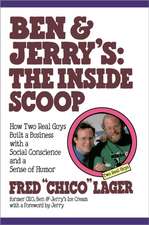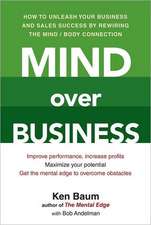Built from Scratch: How a Couple of Regular Guys Grew the Home Depot from Nothing to $30 Billion
Autor Bernie Marcus, Arthur Blank Bob Andelmanen Limba Engleză Paperback – 30 iun 2001
When a friend told Bernie Marcus and Arthur Blank that "you've just been hit in the ass by a golden horseshoe," they thought he was crazy. After all, both had just been fired. What the friend, Ken Langone, meant was that they now had the opportunity to create the kind of wide-open warehouse store that would help spark a consumer revolution through low prices, excellent customer service, and wide availability of products.
Built from Scratch is the story of how two incredibly determined and creative people--and their associates--built a business from nothing to 761 stores and $30 billion in sales in a mere twenty years.
Built from Scratch tells many colorful stories associated with The Home Depot's founding and meteoric rise; shows that a company can be a tough, growth-oriented competitor and still maintain a high sense of responsibility to the community; and provides great lessons useful to people in any business, from start-ups to the Fortune 500.
Great Stories
"Ming the Merciless": The inside account of the man who fired Arthur Blank and Bernie Marcus
"My people don't drive Cadillacs!" How Ross Perot almost got involved with The Home Depot
"Take this job and shove it!" The banker who put his career on the line to get The Home Depot the loan that enabled it to survive
"Folks, I tell ya, if these Atlanta stores were any bigger, we'd be paying Alabama sales tax." Home Depot's first good ol' southern advertising campaign
A Company with a Conscience
When disasters like the Oklahoma City bombing or Hurricane Andrew happen, Home Depot associates don't ask for permission to respond. They react from their hearts--whether that means keeping their store open all night or being on the scene with volunteers and relief supplies.
The Home Depot doesn't just contribute money to organizations like Habitat for Humanity and Christmas in April, but also provides its people to help lead and grow these community efforts.
Great Lessons
Know your customer: In The Home Depot's case, customers don't pay for wider aisles and a pretty store, but for a wide assortment and low prices
Why everyday low prices mean more sales overall: The marketing philosophy The Home Depot learned from talking with Sam Walton
Market leadership: Why The Home Depot never goes to a major new market with plans to open just a few stores
The strategy for profitable growth: How The Home Depot redefined its U.S. market from its $135 billion traditional "do-it-yourself" base to a much larger pond of $365 billion
How to change the rules of the game: How The Home Depot bypassed almost all middlemen, allowing it to pass on huge savings to customers
Built from Scratch is the firsthand account of how two regular guys created one of the greatest entrepreneurial successes of the last twenty years.
Opening the First Store
"What the hell happened? Who screwed up the store? . . . Whatever time remained before the doors were scheduled to open for the first time, we sped around in forklifts, stomping on the brakes, scuffing up the flooring so it would once more look like a warehouse."
Customer Service
"If ever I saw an associate point a customer toward what they needed three aisles over, I would threaten to bite their finger. I would say, 'Don't ever let me see you point. You take the customer by the hand, and you bring them right where they need to be and you help them.'"
Giving Back
"When The Home Depot went public we realized that we had the financial capacity and wherewithal to give back to the communities where we did business. There is a concept in Judaism called tzedaka, which means 'to give back.' It is considered a mitzvah, a good deed, to give to someone who doesn't have, and we believe strongly in giving back to the community."
Selling the Vision
"We had to be psychologists, lovers, romancers, and con artists to get vendors aboard. Our ability to paint a picture of how that would take place--lowest prices, widest selection, and great customer service--was what convinced skeptical manufacturers to sell merchandise to us during the early years."
The Importance of Values
"I have never had anybody work for me in retailing who didn't work for me out of love, as opposed to fear. We carried this approach into building The Home Depot. We care about each other and we care about the customer. The things that we do for customers inside and outside the stores demonstrate our commitment to them. And then when something happens within the company, we circle the wagons. We help each other."
From the Hardcover edition.
Preț: 111.14 lei
Nou
Puncte Express: 167
Preț estimativ în valută:
21.27€ • 22.26$ • 17.60£
21.27€ • 22.26$ • 17.60£
Carte disponibilă
Livrare economică 15-29 martie
Preluare comenzi: 021 569.72.76
Specificații
ISBN-13: 9780812933789
ISBN-10: 0812933788
Pagini: 356
Dimensiuni: 153 x 231 x 20 mm
Greutate: 0.36 kg
Editura: Three Rivers Press (CA)
ISBN-10: 0812933788
Pagini: 356
Dimensiuni: 153 x 231 x 20 mm
Greutate: 0.36 kg
Editura: Three Rivers Press (CA)
Notă biografică
Bernie Marcu is a cofounder of The Home Depot and currently serves as chairman of the board. From the company's inception until 1997, he served as CEO. With his wife, Billi Marcus, he founded the Marcus Foundation and the Marcus Developmental Resource Center, which provides support services for mentally impaired children and their parents. He is chairman of the Centers for Disease Control Foundation. He sits on many boards of directors, including the New York Stock Exchange, and participates in many civic organizations, including the City of Hope, a cancer research center, and the Shepherd Spinal Center.
Arthur Blank is a cofounder of The Home Depot and is the company's president and CEO. He serves on the board of trustees of several organizations, including the North Carolina Outward Bound School, the Carter Center, Emory University, and the National Conference of Christians and Jews. He was inducted into the Babson College Academy of Distinguished Entrepreneurs and was honored by the City of Hope for his fund-raising leadership. He has established the Arthur M. Blank Family Foundation with his wife, Stephanie, and his children.
Bob Andelman lives with his wife and daughter in St. Petersburg, Florida, and has collaborated on many bestselling business books, including Mean Business and The Profit Zone.
From the Hardcover edition.
Arthur Blank is a cofounder of The Home Depot and is the company's president and CEO. He serves on the board of trustees of several organizations, including the North Carolina Outward Bound School, the Carter Center, Emory University, and the National Conference of Christians and Jews. He was inducted into the Babson College Academy of Distinguished Entrepreneurs and was honored by the City of Hope for his fund-raising leadership. He has established the Arthur M. Blank Family Foundation with his wife, Stephanie, and his children.
Bob Andelman lives with his wife and daughter in St. Petersburg, Florida, and has collaborated on many bestselling business books, including Mean Business and The Profit Zone.
From the Hardcover edition.
Extras
"We Take Care of the Customer and Each Other"
You want a formula for success? Take two Jews who have just been fired, add an Irishman who just walked away from a bankruptcy and an Italian running a no-name investment banking firm. Add--then subtract--Ross Perot. Lease space from a shrinking discount chain, fill a space the size of a football field full of hardware (and a few hundred empty boxes), and you've got a company.
At least that's the way we did it.
* * *
The creation of The Home Depot began with two words in the spring of 1978: "You're fired!"
Twenty years ago, we were two out-of-work executives. Our situation was not a lot different than millions of others who were shown the door. We had little in the way of capital and faced some daunting personal and legal challenges as we tried to get our careers back on track.
In our early years, we lived on the edge, with no balance sheet and a lack of financing. It took great romancing to establish the vendor base necessary to open and maintain the broad product selection for which we quickly became known. We were always pushing boundaries beyond where our industry's conventional wisdom suggested we could go.
And it paid off: In just twenty years, our company, The Home Depot, has multiplied exponentially from four stores in Atlanta to 775 stores, 160,000 associates, and $30 billion in sales. Almost all of our growth has come from internal expansion and very little through acquisition. How did we and our associates do it?
Building The Home Depot was a tough, uphill battle from the day we started in a Los Angeles coffee shop shortly after we were fired. No one believed we could do it, and very few people trusted our judgment. Or they trusted our judgment, but just didn't think the whole concept of a home improvement warehouse with the lowest prices, best selection, and best service was going to work. They certainly didn't realize that what we were planning would turn out to be a revolution in the retail business.
While we want to tell the story of The Home Depot because it's a great entrepreneurial tale, our larger goal is to convey what we learned along the way about customers, associates, competitors, growing a business, building a brand, and many other topics everyone in business needs to know.
We're two regular guys from similar modest personal backgrounds and religious orientation who were given a strong drive to succeed by our respective parents. The values that form the core of The Home Depot's business philosophy are bigger than one person. They developed from our families as well as from key business experiences in the early days of our careers.
This book is the story of that virtually unparalleled growth and the values and culture that nourished it.
But we're not a company that's just about numbers. The numbers are important as a measure of our success. But we've attained them because of a culture that is agile and flexible enough to change direction as quickly as events demand it. When something isn't working in our stores, we don't keep doing it the wrong way simply because the rules say to do it that way. Instead, we do it the right way and change the rules. We do things because they're the right things to do for our customer.
A set of eight values has been our bedrock for the past twenty years. Although they were not put in writing until 1995, these values--the basis for the way we run the company--enabled us to explode across the North American landscape and will be the vehicle for reaching our ambitious goals in the international marketplace.
We're only as good as our people--especially the men and women working in our stores every day. If the front line isn't absolutely committed to the cause, we can't win. That's why we believe a sure way of growing this company is to clearly state our values and instill them in our associates. Values are beliefs that do not change over time; they guide our decisions and actions. They are the principles, beliefs, and standards of our company. We call this process of enculturation "breeding orange."
In summary, we care about the customer and we care about each other. As you'll see throughout this book, our values are not platitudes that are dead on arrival on a lobby wall plaque, but are the spine that shapes the way we do business. These are The Home Depot's core values, although they are so universal that they should apply to every company:
Excellent customer service. Doing whatever it takes to build customer loyalty.
Taking care of our people. The most important reason for The Home Depot's success.
Developing entrepreneurial spirit. We think of our organizational structure as an inverted pyramid: Stores and customers are at the top and senior management is on the bottom.
Respect for all people. Talent and good people are everywhere, and we can't afford to overlook any source of good people.
Building strong relationships with associates, customers, vendors, and communities.
Doing the right thing, not just doing things right.
Giving back to our communities as an integral part of doing business.
Shareholder return. Investors in The Home Depot will benefit from the money they've given us to grow our business.
Our values empower people to be their best. If we can implant a value system that lets them apply their basic goodness and ingenuity to The Home Depot and its customers, that's all we need to succeed. That will allow them to do all the right things without us having to constantly tell them.
Nobody loves a company. A company is just a sign. Nobody loves brick and mortar.
These values are our company. They are our belief system, and we believe in them as much today as we did when the first Home Depot stores opened in June 1979. Without them, we're no different than our competition. Our competitors could copy them just as they've copied our stores, products, and merchandising ideas. But they would have to believe in the ideas underlying these values to make them effective, and that's a tough step to take.
The Home Depot--and other companies, such as Wal-Mart--have helped create a consumer revolution through low prices and wider availability of products that was unimaginable twenty years ago. Many of the products now offered by The Home Depot were either too expensive or available only through contractors. Contractors could only get them from distributors or wholesalers and, after all of the markups, many home improvement projects were beyond the means of many middle-class people. Who would have thought that today an average person could walk into a store and buy a complete designer kitchen for $3,000 and get the knowledge to install it at no extra cost? We helped create a market of male and female "weekend warriors" who confidently glide from project to project--and call on us for assistance whenever they hit a rough spot.
In 1981, before we went public, Bernie made speeches locally in the Atlanta area, where we are based. Standing before 400 members of a local Rotary Club, he asked, "How many people consider themselves real do-it-yourselfers?" He described a DIYer as someone who owned power saws, electric drills, etc., or who could change a light fixture. How many, he asked, could repair a toilet themselves rather than call a plumber? "A do-it-yourselfer is somebody who really can do those things," he said.
Out of 400 people, maybe 20 raised their hands.
In 1997, he made another speech to the same group and asked the same question. This time, only 15 out of 450 people did not raise their hands. We had changed America.
* * *
Our employees, customers, and investors all want to hear the story of The Home Depot. "Tell us how it started," they ask. Every colorful detail, every unforgettable, crazy character. When we do store visits, they ask endless questions about the early days of the company. They want to hear what happened, even the most familiar of business legends, in our own words.
Naturally, we enjoy telling these stories. But what's even more important to us is sharing what is learnable and transferable from our experience. For example, while we are still busy on a day-in, day-out basis as cofounders and senior executives, The Home Depot is not a cult of personality. One of our greatest accomplishments is hiring a cadre of people who are smarter than we are and who will one day run this business without us--even better than we did--and not miss a beat.
That's a vital issue to us. Because somewhere around the opening of the 300th Home Depot store a few years ago, we realized there would now be Home Depot stores that we would never visit in person, associates we would never shake hands with or personally welcome aboard.
For people like us who started the business and personally tagged and shelved merchandise and took care of customers in our first stores, to think that today we are opening up stores that we will never see is a scary thought. It is a sobering thought. That speaks to the growing size of the company and the importance of passing on what we know to others.
That raises another issue: It's one thing to have corporate values, but another thing to communicate them. When we had four stores, it was easy. We knew everyone by name and saw them on an almost daily basis. But with 761 stores and 160,000 associates, the challenge is much more complex. We can't control everything that goes on in that many stores. But our values are the magic of The Home Depot. By consistently and emphatically teaching and enculturating them through the ranks of managers and on to the people working in the stores, we know that each and every one of these 160,000 folks will take care of the customer and each other. The rest takes care of itself.
So as you read, we hope you'll pick up a few ideas for building your own business along the way.
* * *
Finally, there may come a day twenty years from now when we will want to go back and remember the truth about The Home Depot. That's the real reason we wrote this book. So we can sit rocking on a porch swing and say to each other, "My God, is that what happened? What a story that was; is it true?"
It is; every word of it. Cross our hearts and swear to bleed orange.
Bernie Marcus
Arthur Blank
Atlanta, Georgia
November 1998
From the Hardcover edition.
You want a formula for success? Take two Jews who have just been fired, add an Irishman who just walked away from a bankruptcy and an Italian running a no-name investment banking firm. Add--then subtract--Ross Perot. Lease space from a shrinking discount chain, fill a space the size of a football field full of hardware (and a few hundred empty boxes), and you've got a company.
At least that's the way we did it.
* * *
The creation of The Home Depot began with two words in the spring of 1978: "You're fired!"
Twenty years ago, we were two out-of-work executives. Our situation was not a lot different than millions of others who were shown the door. We had little in the way of capital and faced some daunting personal and legal challenges as we tried to get our careers back on track.
In our early years, we lived on the edge, with no balance sheet and a lack of financing. It took great romancing to establish the vendor base necessary to open and maintain the broad product selection for which we quickly became known. We were always pushing boundaries beyond where our industry's conventional wisdom suggested we could go.
And it paid off: In just twenty years, our company, The Home Depot, has multiplied exponentially from four stores in Atlanta to 775 stores, 160,000 associates, and $30 billion in sales. Almost all of our growth has come from internal expansion and very little through acquisition. How did we and our associates do it?
Building The Home Depot was a tough, uphill battle from the day we started in a Los Angeles coffee shop shortly after we were fired. No one believed we could do it, and very few people trusted our judgment. Or they trusted our judgment, but just didn't think the whole concept of a home improvement warehouse with the lowest prices, best selection, and best service was going to work. They certainly didn't realize that what we were planning would turn out to be a revolution in the retail business.
While we want to tell the story of The Home Depot because it's a great entrepreneurial tale, our larger goal is to convey what we learned along the way about customers, associates, competitors, growing a business, building a brand, and many other topics everyone in business needs to know.
We're two regular guys from similar modest personal backgrounds and religious orientation who were given a strong drive to succeed by our respective parents. The values that form the core of The Home Depot's business philosophy are bigger than one person. They developed from our families as well as from key business experiences in the early days of our careers.
This book is the story of that virtually unparalleled growth and the values and culture that nourished it.
But we're not a company that's just about numbers. The numbers are important as a measure of our success. But we've attained them because of a culture that is agile and flexible enough to change direction as quickly as events demand it. When something isn't working in our stores, we don't keep doing it the wrong way simply because the rules say to do it that way. Instead, we do it the right way and change the rules. We do things because they're the right things to do for our customer.
A set of eight values has been our bedrock for the past twenty years. Although they were not put in writing until 1995, these values--the basis for the way we run the company--enabled us to explode across the North American landscape and will be the vehicle for reaching our ambitious goals in the international marketplace.
We're only as good as our people--especially the men and women working in our stores every day. If the front line isn't absolutely committed to the cause, we can't win. That's why we believe a sure way of growing this company is to clearly state our values and instill them in our associates. Values are beliefs that do not change over time; they guide our decisions and actions. They are the principles, beliefs, and standards of our company. We call this process of enculturation "breeding orange."
In summary, we care about the customer and we care about each other. As you'll see throughout this book, our values are not platitudes that are dead on arrival on a lobby wall plaque, but are the spine that shapes the way we do business. These are The Home Depot's core values, although they are so universal that they should apply to every company:
Excellent customer service. Doing whatever it takes to build customer loyalty.
Taking care of our people. The most important reason for The Home Depot's success.
Developing entrepreneurial spirit. We think of our organizational structure as an inverted pyramid: Stores and customers are at the top and senior management is on the bottom.
Respect for all people. Talent and good people are everywhere, and we can't afford to overlook any source of good people.
Building strong relationships with associates, customers, vendors, and communities.
Doing the right thing, not just doing things right.
Giving back to our communities as an integral part of doing business.
Shareholder return. Investors in The Home Depot will benefit from the money they've given us to grow our business.
Our values empower people to be their best. If we can implant a value system that lets them apply their basic goodness and ingenuity to The Home Depot and its customers, that's all we need to succeed. That will allow them to do all the right things without us having to constantly tell them.
Nobody loves a company. A company is just a sign. Nobody loves brick and mortar.
These values are our company. They are our belief system, and we believe in them as much today as we did when the first Home Depot stores opened in June 1979. Without them, we're no different than our competition. Our competitors could copy them just as they've copied our stores, products, and merchandising ideas. But they would have to believe in the ideas underlying these values to make them effective, and that's a tough step to take.
The Home Depot--and other companies, such as Wal-Mart--have helped create a consumer revolution through low prices and wider availability of products that was unimaginable twenty years ago. Many of the products now offered by The Home Depot were either too expensive or available only through contractors. Contractors could only get them from distributors or wholesalers and, after all of the markups, many home improvement projects were beyond the means of many middle-class people. Who would have thought that today an average person could walk into a store and buy a complete designer kitchen for $3,000 and get the knowledge to install it at no extra cost? We helped create a market of male and female "weekend warriors" who confidently glide from project to project--and call on us for assistance whenever they hit a rough spot.
In 1981, before we went public, Bernie made speeches locally in the Atlanta area, where we are based. Standing before 400 members of a local Rotary Club, he asked, "How many people consider themselves real do-it-yourselfers?" He described a DIYer as someone who owned power saws, electric drills, etc., or who could change a light fixture. How many, he asked, could repair a toilet themselves rather than call a plumber? "A do-it-yourselfer is somebody who really can do those things," he said.
Out of 400 people, maybe 20 raised their hands.
In 1997, he made another speech to the same group and asked the same question. This time, only 15 out of 450 people did not raise their hands. We had changed America.
* * *
Our employees, customers, and investors all want to hear the story of The Home Depot. "Tell us how it started," they ask. Every colorful detail, every unforgettable, crazy character. When we do store visits, they ask endless questions about the early days of the company. They want to hear what happened, even the most familiar of business legends, in our own words.
Naturally, we enjoy telling these stories. But what's even more important to us is sharing what is learnable and transferable from our experience. For example, while we are still busy on a day-in, day-out basis as cofounders and senior executives, The Home Depot is not a cult of personality. One of our greatest accomplishments is hiring a cadre of people who are smarter than we are and who will one day run this business without us--even better than we did--and not miss a beat.
That's a vital issue to us. Because somewhere around the opening of the 300th Home Depot store a few years ago, we realized there would now be Home Depot stores that we would never visit in person, associates we would never shake hands with or personally welcome aboard.
For people like us who started the business and personally tagged and shelved merchandise and took care of customers in our first stores, to think that today we are opening up stores that we will never see is a scary thought. It is a sobering thought. That speaks to the growing size of the company and the importance of passing on what we know to others.
That raises another issue: It's one thing to have corporate values, but another thing to communicate them. When we had four stores, it was easy. We knew everyone by name and saw them on an almost daily basis. But with 761 stores and 160,000 associates, the challenge is much more complex. We can't control everything that goes on in that many stores. But our values are the magic of The Home Depot. By consistently and emphatically teaching and enculturating them through the ranks of managers and on to the people working in the stores, we know that each and every one of these 160,000 folks will take care of the customer and each other. The rest takes care of itself.
So as you read, we hope you'll pick up a few ideas for building your own business along the way.
* * *
Finally, there may come a day twenty years from now when we will want to go back and remember the truth about The Home Depot. That's the real reason we wrote this book. So we can sit rocking on a porch swing and say to each other, "My God, is that what happened? What a story that was; is it true?"
It is; every word of it. Cross our hearts and swear to bleed orange.
Bernie Marcus
Arthur Blank
Atlanta, Georgia
November 1998
From the Hardcover edition.







